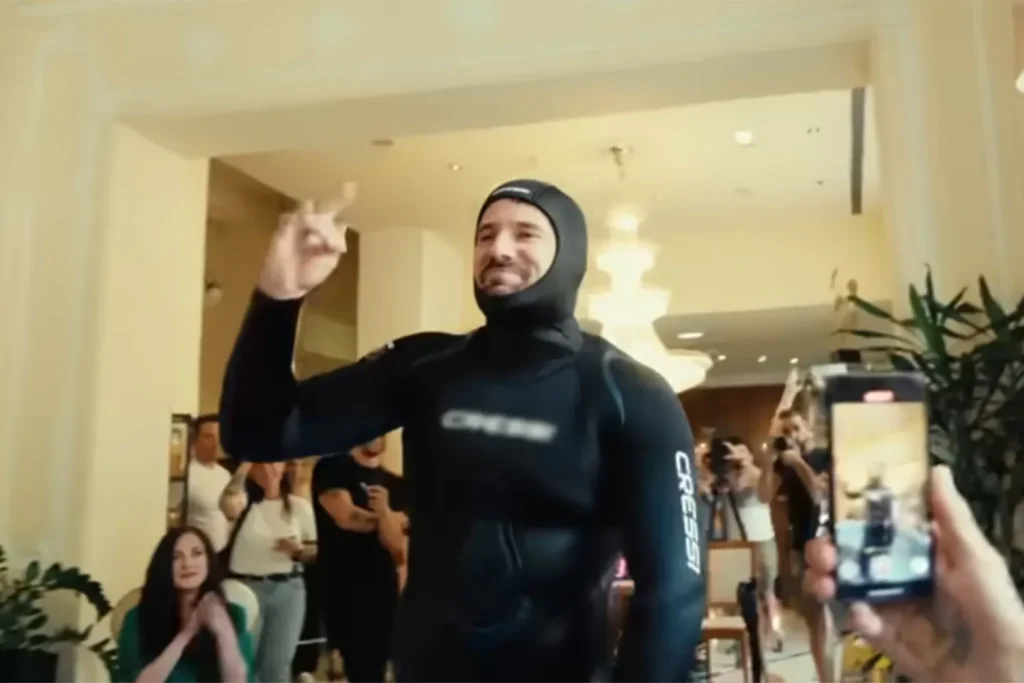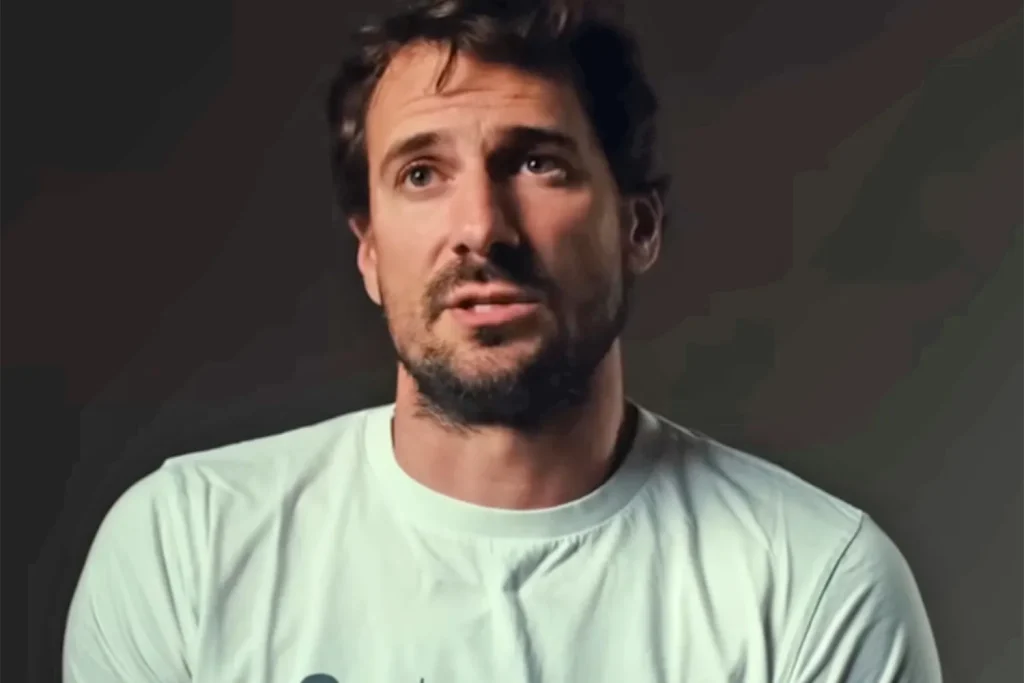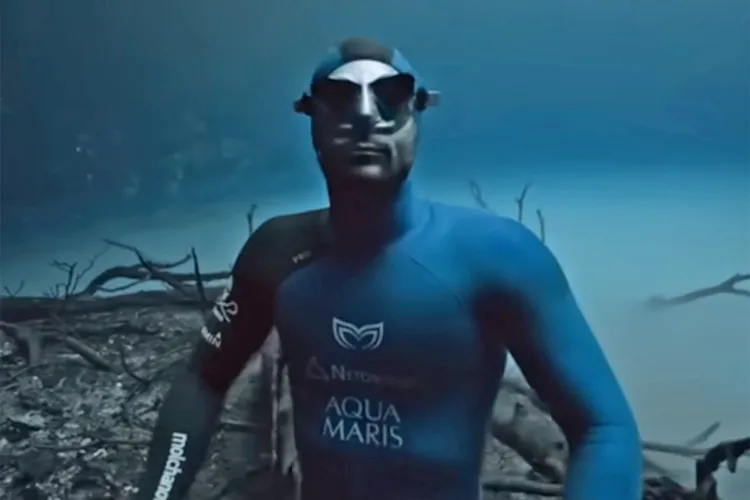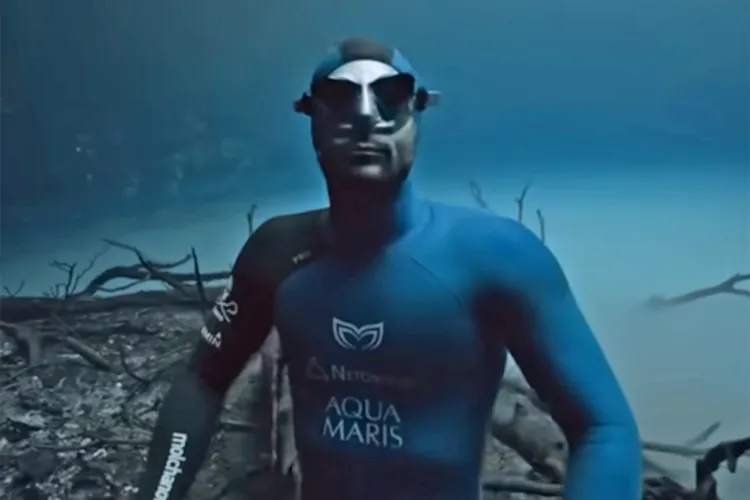How Freediver Vitomir Maričić Set a World Record by Holding His Breath Underwater for 29 Minutes and 3 Seconds — ‘One of the Worst Experiences in My Life’
In a feat that defies what most of us believe possible, Croatian freediver Vitomir Maričić has rewritten the boundaries of human endurance by holding his breath underwater for 29 minutes and 3 seconds. The extraordinary attempt, which took place on June 14, 2025, in a three-metre-deep pool at the Bristol Hotel in Opatija, Croatia, was witnessed by roughly a hundred spectators and officially certified by Guinness World Records as the longest voluntary breath-hold ever recorded by a man.

From the very start, Maričić knew he was venturing into a realm few humans could survive. Before beginning, he spent ten minutes breathing pure oxygen — a process known as denitrogenation — which saturates the bloodstream with oxygen and delays the suffocating buildup of carbon dioxide. Then he descended into the water and went completely still, face down, his body suspended in silence as his mind and lungs waged an invisible war. “I seriously think it was one of the worst experiences in my life,” he later said.
The previous world record, 24 minutes 37 seconds, had been set by fellow Croatian Budimir Šobat in 2021. Maričić shattered that time by nearly five full minutes, raising new questions about how far human physiology can be pushed before it breaks. But those 29 minutes were no calm meditation. They were, in his own words, “painful, lonely, and endless.”
In the early minutes, things felt manageable. By the seven-minute mark, though, the first sharp contractions began as his body demanded air. “Your chest is trying to spread out because your body is trying to force you to inhale,” he said. “You just keep resisting.” Around thirteen minutes in, the pain peaked. Every nerve seemed to scream for oxygen. “It was so hard,” he admitted. “There were so many contractions that it was physically exhausting. I told myself, ‘It’s fine if you don’t make it. All you can do is your best.’”

Time stopped making sense. To survive, he broke the ordeal into fragments: ten more seconds, then another ten. Each passing minute became a mountain. When his coach signaled he’d passed the 20-minute mark, Maričić said a wave of mental calm came over him — though the physical agony only grew worse. “After 20 minutes, it got easier in my head, but my diaphragm was burning. The contractions were violent. Still, I knew I wouldn’t give up.”
When he finally surfaced at 29 minutes 3 seconds, the crowd exploded in cheers. He gasped for air, half-conscious, his body trembling. The victory was real, but so were the consequences. He later described experiencing a massive headache that lasted through the night and two more days afterward. “It was brutal,” he said. “When I finished, I told myself, ‘I’m not doing this again.’”
Maričić, now 36, is far from a newcomer to pushing human limits. A multiple-time national freediving champion, he’s long been a student of what the human body can withstand under pressure. He also uses his platform to advocate for ocean conservation, often warning that “overfishing and pollution are destroying the seas that give us life.” For him, this record wasn’t just personal glory. “It’s a statement about human potential — and about protecting the water that gives us that potential.”

Experts note that his technique placed the record in a specific Guinness category — breath-holding with pre-oxygenation. Most unaided freedivers, relying only on natural lung capacity, can hold their breath for around ten to eleven minutes. The pure-oxygen method, however, dramatically extends the window by increasing oxygen saturation and reducing carbon dioxide accumulation. Even then, the risk remains immense: blackouts, brain hypoxia, and organ damage are constant threats.
To the untrained eye, Maričić’s motionless body under water might look serene. In reality, each second is a battle. His heart rate slowed to under 30 beats per minute. His muscles stiffened. Blood flow redirected from limbs to preserve his brain and heart. As the minutes dragged on, his body essentially entered a controlled survival mode — a state few people could tolerate while conscious.
“The hardest part isn’t physical,” Maričić explained afterward. “It’s mental. You’re alone with your thoughts, fighting a primal instinct. Every cell in your body is screaming, but your mind has to stay calm. That’s the true test.”
By the time the timer stopped, his body had consumed nearly all available oxygen reserves. The moment he emerged, his first breath was shaky and explosive — a reflex as much as a release. In videos of the attempt, his relief is visible: he removes his goggles, raises a hand weakly in triumph, and smiles through exhaustion as the room erupts in applause.
What followed, though, was less glamorous. He says his head throbbed for days, his muscles cramped, and he couldn’t sleep. “My brain just hurt,” he laughed, describing how he ended up celebrating that night with drinks despite the fatigue. “Probably not the smartest idea,” he joked.
Whether or not he’ll attempt to break his own record remains uncertain. “When I finished, I said to myself, ‘Never again.’ But then, a few days later, I started thinking — maybe I can go a bit longer.”
For Maričić, the record isn’t only about endurance; it’s about curiosity. What happens when you strip away air, movement, even time itself? What’s left of a person when every instinct screams to survive, but you tell yourself to wait just a little longer? Those questions, he says, keep him fascinated.
He’s the first to warn others not to try such feats without expert training and medical supervision. “It’s extremely dangerous,” he said. “People think it’s just about holding your breath. It’s not. It’s about years of conditioning your body to work differently. One mistake, and you don’t come back up.”
The physiological science behind it supports his warning. As oxygen levels drop, the brain begins to malfunction, causing tunnel vision, disorientation, and sometimes unconsciousness. A single blackout underwater can be fatal within seconds. Even with professional spotters, Maričić risked his life for this record — and he knows it.
Still, he insists he wasn’t chasing fame. “I just wanted to see what was possible. That’s all,” he said simply. His humility stands in contrast to the enormity of the record. Nearly thirty minutes without a breath — it’s a number that almost doesn’t sound human. Yet it happened, and it will stand in the history books until someone even bolder comes along.
Whether or not that day arrives soon, Vitomir Maričić has already proven something extraordinary: the limits of endurance are far beyond what most of us imagine. Beneath the surface of that quiet pool, he faced something primal — the fear of suffocation, the pull of instinct — and didn’t flinch. When he finally took that breath again, it wasn’t just air filling his lungs. It was victory, survival, and proof that courage sometimes comes in the form of silence.


